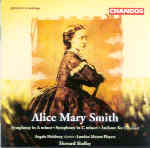Alice Mary Smith (1839-1884) had talent. The music on this disc proves that this particular female British composer was not content to merely match the comparative dullness of her male compatriots. The two symphonies on display here, both appealingly based in minor keys, reveal a skilled handling of the orchestra (particularly wind instruments in the two slow movements), a sure command of form, far from routine use of harmony, and a winsome melodic gift. When it comes to models and inspiration, the booklet notes of course suggest Mendelssohn, but I would go back a bit farther, perhaps to Mozart or Schubert–not just because of the woodwind writing, nor because of the music’s inherent conservatism, but rather because of its suppleness and elegance, recalling perhaps the two symphonies of Gounod, or Bizet’s Symphony in C. If you enjoy any of those works, you will certainly find much pleasure here. The lovely Andante for Clarinet and Orchestra, an arrangement of a movement from the composer’s Clarinet Sonata, once again reveals Smith’s natural affinity for this most vocal of instruments, and Angela Malsbury plays it beautifully, as do her London Mozart Players colleagues and Howard Shelly. Fine sonics make this definitely worth a listen: it’s good music, plain and simple.
































